Raise your hand if you’ve ever dealt with the uncomfortable, unsightly annoyance of chapped, dry lips. I know I have, and it’s not a fun experience. Whether it’s the harsh winter winds, blistering summer sun, or simply a case of chronic dehydration, having painfully cracked, flaky lips can really take a toll on your confidence and overall appearance.
But the good news is, chapped lips don’t have to be a lifelong problem. In this comprehensive guide, I’m going to share five insider tips – backed by personal experience and expert advice – to help you finally get your lips back to a smooth, healthy, and hydrated state. From gentle exfoliation to targeted nourishment, you’ll walk away with a foolproof plan for treating and preventing those pesky chapped lips for good.
Understanding the Causes of Chapped Lips
Before we dive into the solutions, it’s important to understand what’s causing your lips to become dry and chapped in the first place. There are a few key culprits:
Environmental Factors: Exposure to harsh weather conditions like wind, cold, and sun can quickly strip the delicate skin on your lips of its natural moisture. Dry, low-humidity climates also tend to exacerbate the problem.
Lifestyle Habits: Things like licking your lips, breathing through your mouth, and using certain medications can all contribute to chronic dehydration and chapping. And don’t forget the drying effects of caffeine and alcohol!
Skin Conditions: Underlying issues like eczema, psoriasis, or even just sensitive skin can make the lip area more prone to dryness and cracking.
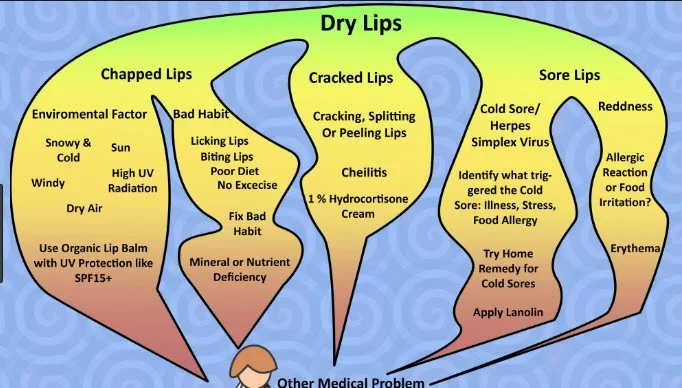
Nutritional Deficiencies: A lack of essential vitamins and fatty acids in your diet can impair the skin’s barrier function, leading to increased moisture loss.
Understanding the root causes is key to developing an effective treatment plan. Once you’ve pinpointed the main culprits behind your chapped lips, you can start tackling the problem at its source.
Insider Tip #1: Exfoliate Gently
One of the most important steps in reviving chapped, flaky lips is gentle exfoliation. Regularly removing the dead, dry skin cells that accumulate on the lip surface is crucial for allowing new, healthy skin to emerge.
However, it’s important to approach lip exfoliation with a light touch. Unlike the more resilient skin on your face, the delicate lip area can easily become irritated and further damaged by overzealous scrubbing.
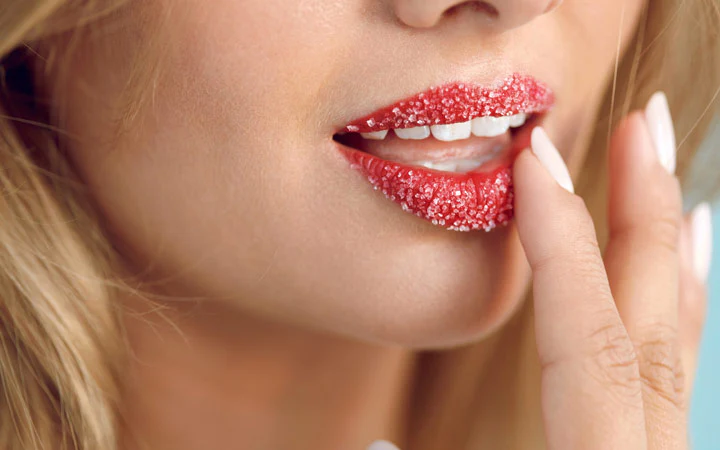
My personal go-to method is to gently massage a soft, damp washcloth or a soft-bristled toothbrush in small, circular motions over my lips a few times per week. You can also try a nourishing, sugar-based lip scrub, but be sure to avoid anything too abrasive.
The key is to focus on the flaky areas without tugging or pulling at the skin. Gentle, consistent exfoliation will help smooth out your lips and prepare them to better absorb all the hydrating, repairing treatments to come.
Insider Tip #2: Hydrate from Within
While topical lip care products are essential, nourishing your lips from the inside out is just as important when it comes to treating chapped, dry skin. What you put into your body has a direct impact on the health and appearance of your lips.
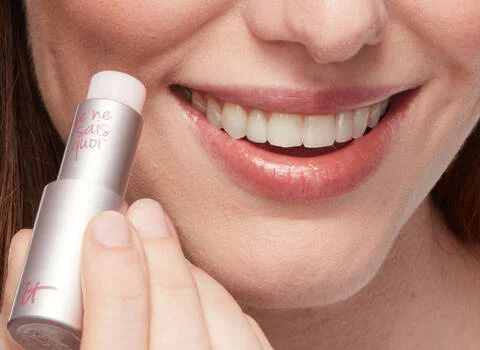
Staying hydrated by drinking plenty of water throughout the day is a must. Dehydration is one of the primary culprits behind chronically parched, cracked lips, so make sure you’re replenishing your body’s moisture levels.
Beyond water, certain nutrients play a crucial role in maintaining a strong, healthy skin barrier – the very thing that keeps your lips soft, smooth, and protected. Look for foods rich in vitamins C and E, as well as healthy fats like omega-3s and omega-6s. Good sources include citrus fruits, leafy greens, avocados, nuts, and fatty fish.
You can also consider taking a high-quality, biotin-infused lip supplement to provide an extra boost of nourishment from the inside. Just be patient and consistent, as it can take several weeks to see the full benefits. Hydrating your body, both externally and internally, is an essential part of the equation for treating and preventing chapped lips.
Insider Tip #3: Seal in Moisture
Once you’ve exfoliated and nourished your lips, the next step is to seal in all that replenishing hydration. Occlusive lip balms and ointments are key players in this process.
Look for lip products containing emollient ingredients like beeswax, shea butter, petroleum, and plant-based oils. These create a protective barrier that locks moisture into the delicate lip area, preventing it from evaporating.
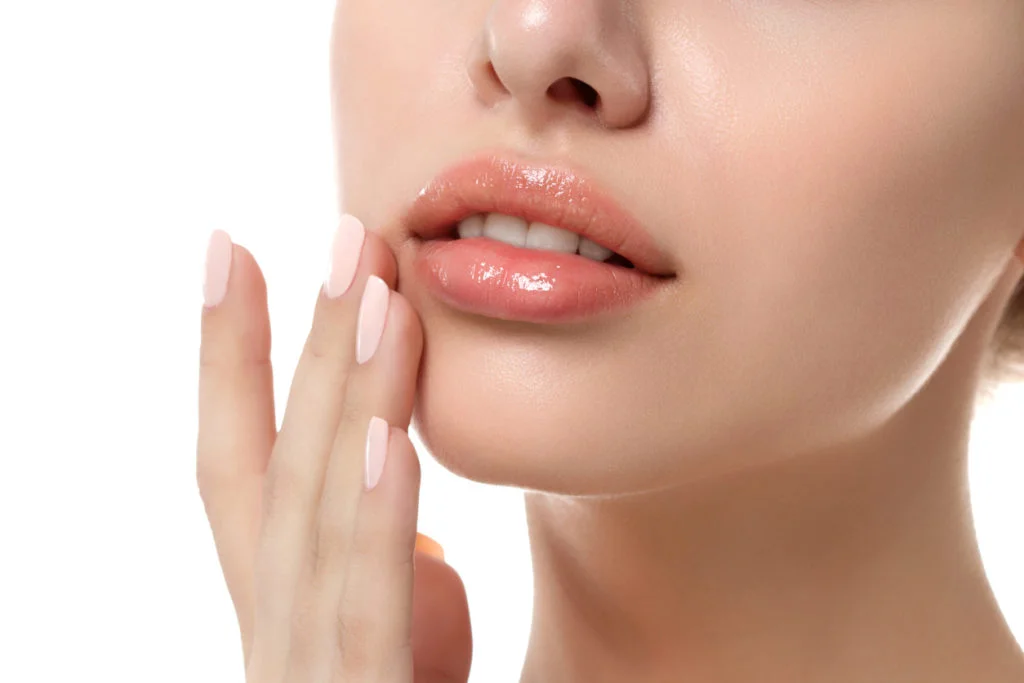
I’m a big fan of thick, creamy lip balms that provide an extra layer of nourishment. Formulas with added ingredients like vitamins, antioxidants, and ceramides can further strengthen the skin’s barrier function and keep lips soft, smooth, and healthy-looking.
Be sure to apply your lip balm liberally and often, especially before bed when your lips are most vulnerable to moisture loss. Reapply as needed throughout the day, focusing on any particularly dry or cracked areas.
Sealing in hydration is the final step in our trio of insider tips for treating chapped lips. With exfoliation, nourishment, and occlusion working in harmony, you’ll be well on your way to reviving your pout.
Insider Tip #4: Protect from the Elements Your Lips
While the previous tips have focused on repairing and replenishing your lips, it’s also crucial to protect them from further damage caused by environmental aggressors. After all, the delicate skin on your lips is no match for harsh winds, dry air, and intense sun exposure.
That’s why incorporating lip-specific sun protection into your routine is a must, regardless of the season. Look for lip balms, glosses, or ointments that contain broad-spectrum SPF 30 or higher. This helps shield your lips from harmful UV rays that can exacerbate dryness, flakiness, and even lead to premature aging.
But sun protection isn’t the only way to shield your pout. Covering up with a scarf or mask during cold, windy weather can also act as a barrier to prevent further moisture loss. And using a humidifier at home or in the office can help counteract the drying effects of indoor heating and air conditioning.
By proactively protecting your lips from external stressors, you’ll be able to maintain the healthy, hydrated results you’ve worked so hard to achieve.
Insider Tip #5: Address Underlying Conditions
In some cases, persistent or severe chapped lips may be a symptom of an underlying medical condition that requires professional treatment. If your lips remain stubbornly dry, cracked, and uncomfortable despite your best efforts, it may be time to consult a dermatologist.
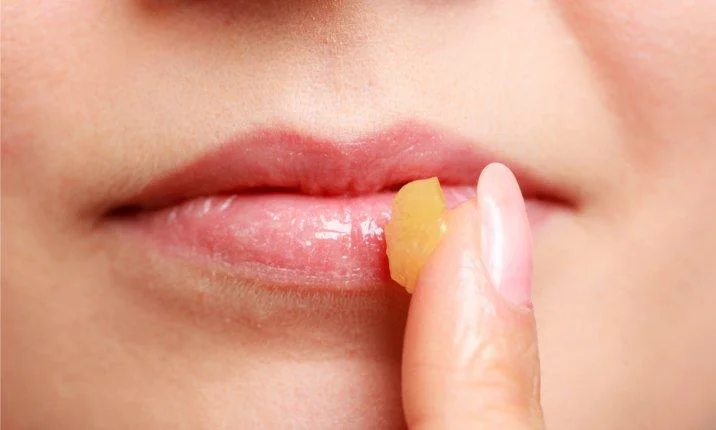
Conditions like eczema, psoriasis, and even certain vitamin deficiencies can manifest as chronic lip dryness and irritation. A skincare specialist can properly diagnose the root cause and prescribe the appropriate medical-grade treatments, whether that’s a specialized ointment, gentle exfoliant, or dietary supplement.
Don’t hesitate to seek expert help, especially if your chapped lips are accompanied by redness, swelling, or other concerning symptoms. With the right diagnosis and treatment plan, you can finally find long-lasting relief and restore your lips to their former healthy, hydrated glory.
Conclusion
Chapped, dry lips don’t have to be an endless struggle. By implementing these five insider tips – gentle exfoliation, nourishing hydration, occlusive sealing, environmental protection, and addressing underlying issues – you can finally overcome even the most stubborn cases of lip dryness.
Be patient, persistent, and don’t be afraid to experiment to find the right combination of products and practices that work best for your unique lips. With a little TLC and a whole lot of moisture, you’ll be on your way to revealing soft, supple, and radiant lips that will have you feeling confident and comfortable in your own skin.
So what are you waiting for? Let’s get those lips looking and feeling their absolute best!
People Also Ask
What causes chapped, dry lips?
There are several key factors that can lead to chronically chapped, dry lips:
Environmental Factors:
- Exposure to harsh weather conditions like wind, cold, and sun
- Low-humidity climates that strip moisture from the delicate lip skin
- Indoor heating and air conditioning that exacerbate dryness
Lifestyle Habits:
- Frequent licking or biting of the lips
- Breathing through the mouth, especially while sleeping
- Using certain medications that can have a drying effect
- Consuming dehydrating substances like caffeine and alcohol
Skin Conditions:
- Underlying issues like eczema, psoriasis, or allergies
- Sensitivity to certain ingredients in lip care products
- General skin dryness and impaired barrier function
Nutritional Deficiencies:
- Lack of essential vitamins, minerals, and fatty acids
- Poor dietary habits that don’t support healthy skin
Understanding the root causes behind your chapped lips is the first step in developing an effective treatment plan. Addressing the underlying factors, both internally and externally, is crucial for restoring soft, supple lips.
How can I tell if my lips are severely chapped?
There are a few telltale signs that your chapped lips have progressed to a more severe state:
- Intense discomfort and pain: If your lips feel raw, burning, or even bleed when cracked, this indicates a deep level of dryness and irritation.
- Visible cracking and peeling: Severely chapped lips will often develop noticeable cracks, flakes, and peeling skin that’s difficult to heal.
- Swelling and inflammation: Excessive dryness can cause the lip area to become red, swollen, and potentially infected.
- Impaired function: When chapping is severe, everyday tasks like eating, drinking, and speaking may become difficult and uncomfortable.
- Lack of response to basic lip care: If your usual lip balms and ointments are no longer providing relief, that’s a sign the condition has worsened.
If you’re experiencing any combination of these symptoms, it’s time to take a more proactive, targeted approach to repairing your lips. Gentle exfoliation, intensive hydration, and even professional treatment may be necessary to overcome severely chapped skin.
Don’t hesitate to consult a dermatologist if your chapped lips persist or worsen despite your best efforts at home. Catching and treating the problem early can prevent further complications.
What are the best ingredients for treating chapped lips?
When it comes to reviving chapped, dry lips, there are several key ingredients that work exceptionally well:
- Humectants:
- Hyaluronic acid – Draws moisture into the skin and plumps up dry areas
- Glycerin – An effective humectant that helps attract and retain water
- Emollients:
- Beeswax – Forms a protective barrier to lock in hydration
- Shea butter – A rich, creamy emollient that nourishes and softens
- Plant-based oils (e.g., coconut, jojoba, argan) – Replenish the skin’s lipids
- Occlusives:
- Petrolatum – Seals in moisture and prevents evaporation
- Dimethicone – Creates a breathable, protective film on the lips
- Soothing Agents:
- Ceramides – Reinforce the skin’s natural barrier function
- Panthenol (pro-vitamin B5) – Has calming, moisturizing properties
- Aloe vera – Soothes irritation and provides a cooling sensation
- Antioxidants:
- Vitamin E – Helps repair and protect the skin
- Vitamin C – Boosts collagen production for plumper lips
Look for lip balms, ointments, and treatments that contain a blend of these moisturizing, nourishing, and protective ingredients. Applying them consistently, both day and night, is key to restoring soft, healthy lips.
How often should I exfoliate my lips?
When it comes to exfoliating chapped, dry lips, moderation is key. Over-exfoliating can actually do more harm than good by stripping the delicate lip skin of its natural oils and causing further irritation.
As a general guideline, most experts recommend exfoliating the lips 1-2 times per week. This gentle, regular sloughing of dead skin cells helps prepare the lips to better absorb nourishing lip treatments and prevents flakiness from building up.
For a physical exfoliant, you can use a soft-bristled toothbrush or a damp washcloth to gently massage and buff away dry skin in small, circular motions. Avoid anything too abrasive, as this can tear and damage the already-compromised lip area.
Alternatively, you can opt for a chemical exfoliant in the form of a lip scrub containing gentle ingredients like sugar, honey, or lactic acid. Just be sure to choose a formula that’s free of harsh irritants and apply it with a light touch.
If your lips are severely chapped and cracked, you may want to scale back the exfoliation frequency to once a week or less until the condition improves. Overdoing it can exacerbate the problem and slow down the healing process.
The key is to listen to your lips and adjust your exfoliation routine accordingly. With a gentle, consistent approach, you can effectively slough away flakiness without causing further damage.
Can diet and hydration impact the health of my lips?
Absolutely! What you put into your body has a direct impact on the appearance and health of your lips. Both your dietary habits and overall hydration levels play a crucial role in maintaining soft, supple, and nourished lips.
Dietary Factors:
- Essential fatty acids like omega-3s and omega-6s help support the skin’s natural barrier function. Good sources include fatty fish, avocados, nuts, and seeds.
- Vitamins C and E are important antioxidants that promote collagen production and protect the delicate lip skin. You can find them in citrus fruits, leafy greens, and bell peppers.
- B-complex vitamins, including biotin, help keep the lips hydrated and healthy. Eggs, legumes, and whole grains are excellent sources.
- Zinc is vital for wound healing and tissue repair, making it beneficial for chapped, cracked lips. Oysters, red meat, and pumpkin seeds are high in zinc.
Hydration:
- Dehydration is one of the primary culprits behind chronically dry, flaky lips. Drinking plenty of water throughout the day is essential for maintaining optimal moisture levels.
- Caffeinated and alcoholic beverages can have a drying effect, so be mindful of your intake and be sure to offset each cup with an equal amount of water.
- Incorporating hydrating, water-rich foods like fruits and vegetables into your diet can also help support healthy, supple lips from the inside out.
By nourishing your body with the right nutrients and staying well-hydrated, you can give your lips a major boost in their ability to maintain their natural moisture barrier and resilience. It’s an important complement to your topical lip care routine.
What’s the best way to seal in moisture for my lips?
When it comes to sealing in moisture and keeping your lips hydrated, occlusive lip balms and ointments are key. These create a protective barrier that locks in hydration and prevents further evaporation.
Look for lip products containing emollient ingredients like:
- Beeswax: Forms a protective, breathable seal on the lips
- Shea butter: A rich, creamy emollient that deeply nourishes
- Plant-based oils (e.g., coconut, jojoba, argan): Help replenish the skin’s natural lipids
- Petrolatum: An effective occlusive that prevents moisture loss
Applying these types of occlusive, moisturizing lip balms and ointments throughout the day, and especially before bedtime, is crucial for restoring and maintaining hydrated, healthy lips.
You can also layer these products for added protection. First, apply a hydrating serum or essence to drench your lips in moisture. Then, seal it all in with a thick, creamy balm or ointment. This “sandwich” approach ensures the moisture has nowhere to go but into your lips.
Be sure to reapply your lip balm or ointment frequently, especially after activities that can further strip moisture like eating, drinking, or being out in the elements. Maintaining that protective, hydrating barrier is key to preventing and treating chapped, dry lips.
With the right occlusive products and a consistent application routine, you can ensure your lips stay soft, supple, and deeply nourished all day long.
Do I need to use lip balm with SPF?
When it comes to protecting your lips from the damaging effects of UV exposure, using a lip balm or ointment with built-in broad-spectrum SPF is an absolute must.
The delicate skin on your lips lacks the melanin that helps shield the rest of your face from sun damage. This makes your lips highly susceptible to sunburn, premature aging, and even skin cancer if left unprotected.
Applying a lip balm or gloss with an SPF of 30 or higher, even on cloudy days, helps create a protective barrier that blocks both UVA and UVB rays. This prevents further drying, cracking, and irritation caused by sun exposure.
Look for lip products that contain zinc oxide or titanium dioxide as the active sun-blocking ingredients. These mineral-based SPFs tend to be gentler and more soothing for chapped, sensitive lips compared to chemical sunscreens.
Reapplying your lip balm with SPF throughout the day, especially after eating, drinking, or sweating, is also important for maintaining adequate coverage and protection. Don’t forget to extend the application to the entire lip area, not just the center.
By making sun-protective lip care a consistent part of your daily routine, you can help prevent further damage to your already-compromised lips while also shielding them from the accelerated aging effects of UV exposure.
When should I see a dermatologist about chronic chapped lips?
If you’ve been diligently following a targeted lip care regimen and implementing lifestyle changes, but your chapped, dry lips just won’t seem to improve, it may be time to consult a dermatologist.
Here are some signs that professional help is warranted:
- Severe, unrelenting dryness and discomfort: If your lips feel constantly tight, cracked, and painful despite your best efforts, a skincare specialist can help get to the root of the problem.
- Persistent irritation and inflammation: When chapping is accompanied by redness, swelling, or other signs of irritation that don’t subside, it could indicate an underlying skin condition.
- Lack of response to over-the-counter treatments: If your usual lip balms and ointments are no longer providing relief, a dermatologist can prescribe more potent, medical-grade therapies.
- Presence of other skin concerns: Chronic chapped lips may coexist with or exacerbate issues like eczema, psoriasis, or even oral herpes, all of which require specialized care.
- Suspicion of a medical condition: In some cases, persistently dry, cracked lips could be a symptom of an internal health issue, such as a vitamin deficiency or thyroid disorder.
A dermatologist can perform a comprehensive evaluation, identify any underlying factors contributing to your chapped lips, and recommend the appropriate treatment plan. This may include prescription-strength ointments, medicated exfoliants, or even in-office procedures like chemical peels.
Don’t hesitate to seek professional guidance if your home remedies aren’t providing the relief you need. With the help of a skincare expert, you can get to the root of your chronic lip dryness and finally achieve the healthy, hydrated pout you deserve.
Are there any temporary fixes for instant lip hydration?
While building a consistent, long-term lip care routine is the best way to achieve lasting results, there are a few temporary fixes you can turn to for instant relief from chapped, dry lips:
- Face Mists and Essences:
- These quick-absorbing, hydrating sprays can provide an instant boost of moisture to thirsty lips.
- Look for formulas containing humectants like glycerin or hyaluronic acid.
- Spritz directly onto your lips as needed throughout the day.
- Overnight Lip Masks or Sleeping Packs:
- Thick, occlusive overnight treatments help seal in hydration while you sleep.
- Ingredients like ceramides, shea butter, and dimethicone create a protective barrier.
- Apply a generous layer before bed and wake up to plump, replenished lips.
- Hydrating Lip Serums:
- Concentrated serums packed with humectants can quickly flood the lips with moisture.
- Apply a small amount before your regular lip balm or ointment, focusing on dry areas.
- Lip Oils:
- Nourishing oils like jojoba, marula, and rosehip can provide an extra hit of emolliency.
- Gently massage a few drops onto clean lips to seal in hydration.
- Cooling Tools:
- Gently pressing a chilled metal applicator or ice cube onto the lips can temporarily soothe and plump dry, cracked areas.
- The cold temperature helps reduce inflammation and discomfort.
Remember, these temporary fixes are just that – temporary. They can provide instant relief, but to truly overcome chronic lip dryness, you’ll need to adopt a comprehensive, long-term lip care routine and make adjustments to any lifestyle factors that may be contributing to the problem.
Be patient, consistent, and don’t hesitate to experiment until you find the perfect combination of products and practices that work best for your unique lips. With the right approach, you can get those pout-perfect results you’ve been craving.
How long does it take to repair severely chapped lips?
The timeline for repairing severely chapped, dry lips can vary quite a bit from person to person, as it depends on several key factors:
- Severity of the Chapping:
- Mild to moderate cases of lip dryness may respond more quickly to treatment.
- Deeply cracked, flaky, and irritated lips require more time and consistent effort to fully heal.
- Underlying Causes:
- If the chapping is primarily driven by environmental factors or lifestyle habits, it may be easier to address.
- Existing skin conditions or medical issues can make the recovery process more complex and drawn-out.
- Commitment to a Targeted Routine:
- Diligently following a lip-focused skincare regimen can speed up the healing process.
- Inconsistent or improper product use can prolong the time it takes to see significant improvements.
- Lifestyle Adjustments:
- Making sustainable changes to increase hydration, manage stress, and protect the lips from further damage all support faster recovery.
- Slow adoption of new habits can hamper progress.
As a general guideline, most people start to see noticeable improvements in the appearance and comfort of their lips within 2-4 weeks of implementing a dedicated lip care routine. However, it can take 6-12 weeks or longer for severely chapped lips to fully repair and regain their healthy, supple state.
The key is to be patient, persistent, and consistent with your approach. Expecting overnight results is unrealistic, as restoring deeply compromised lip skin requires time, dedication, and a multifaceted treatment plan.
Stick with it, and you’ll be rewarded with soft, smooth, and comfortable lips that will have you feeling confident and ready to take on the world. Don’t give up – your dream pout is closer than you think!

